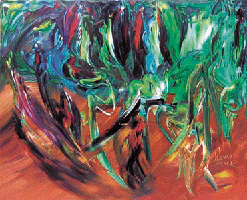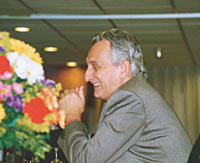|
Weekly
magazine through Internet
Indio Gris FUSIONED - DIRECTED - WRITTEN AND CORRESPONDED BY: MENASSA 2003 WE
DON'T KNOW HOW TO SPEAK BUT WE DO IT IN SEVERAL LANGUAGES INDIO
GRIS, IS A PRODUCT INDIO GRIS Nº 169 YEAR IV Dear
readers, as we had told you, we have been in Buenos Aires because of the "OIL
PAINTINGS EXHIBIT BY MIGUEL OSCAR MENASSA, IN THE GENERAL SAN MARTÍN CULTURAL
CENTRE, HALL 1. From the 5TH to
the 31ST
of August. and
also XIV
Cero Group
International Congress "THE WOMAN AND I". A Congress on sexuality
according to the poetics posed
in the book " The woman and I" by Miguel Oscar Menassa and
we continue with the press notes: INTERVIEW
WITH MIGUEL OSCAR MENASSA FOR PÁGINA 12 NEWSPAPER, in the supplement LAS/12 by
FLORENCIA GEMETRIO
Menassa's
women
Painter,
writer and psychoanalyst by vocation, acting both in Buenos Aires and in Madrid,
Miguel Menassa anticipates a feminine revolution -No, it isn't the revolution of
the fifties nor the sixties- which will start with poetry and will even put an
end to capitalistic comfort. Everything according to himself. The
feminine gaze from an oil painting dominates the central space in the Northern
District. An elderly man remains seated by the painting. There is something from
him in the gaze. Miguel Menassa, that man is the painter. But he is not only a
painter but also a psychoanalyst, a poet and a writer. He says he was born twice:
in Buenos Aires and in Madrid, where he lives since his exile in 1978. He has
dedicated himself to the research of women for over 35 years. His production
combines psychoanalysis and art. The results of that realisation are condensed,
innovative and chaotic, in The Woman and I, a book of poems which was analysed
in the last International Congress organised by Cero Group Psychoanalysis and
Poetry School. The encounter took place the last weekend in the San Martín
Cultural Centre, where almost 500 participants reflected about sexuality,
feminine pleasure and a particular vision about the female revolution. Menassa's
vision. In
the book there are masochist, domineering, miserable, ambitious, docile,
glamorous and violent women. There are submissive, aggressive, feminine,
conceited, male chauvinist and repulsive men. There are characters possessed by
banal fantasies that chat in imaginary dialogues without mediation. There are no
impossible or possible loves because there is no one idea of love but multiple
concepts in which the protagonists are diverse characters. But none of them is
resumed in specific masculine or feminine stereotype. Menassa defends all of
them with rigour during the interview. He says that they are symbols of an epoch,
this one, eventhough he does not identify himself with them. He says that they
are part of "the poetic production which will lead a new revolution which
will be commanded by women". What would that be about?. -A
woman has to formulate her own thesis about how life should be lived, how she
should work and what to do with the produce of work, because she's the only one
who can revolutionise sense. She has to end being an object of desire and become
a desiring individual. Women have participated in men's revolutions but they
have never fought their own. Those processes didn't belong to them. They were
congruent with a masculine modality which were excluding of thinking reality.
Masculine revolutions have already failed. Christianity failed, Marxism should
be revised because it failed in the intention of making it a state policy and
the capitalistic society of comfort failed. None of them could manage women and
men's lives. And we are in the same place as 500 years ago. -What
then could be achieved? -A
project where the woman can be protagonist of the movements which
originate changes in society. I don't know how it might be but I think it
will be led by poetry. It wasn't easy for me to write the poems because I don't
agree with anything I wrote, but the poet is a snitch of his time, of the world
we live in, definitively, he's a historian. Every revolution was anticipated by
a poet and I believe woman is creating her poem. -Which
would be the link between poetry and that change? -There
is an irredeemable likelihood between poetry and interpretation in
psychoanalysis. Both are instruments which unveil the mysteries of reality. They
are liberating. For Lacan, the unconscious structures itself like a language. I
think it is structured in the shape of poetry. And if it is possible to change
language, it is possible to change reality. If there is interpretation, the
individual already changed and, in the present systems, that means living in a
world which isn't this one. -Would
the women and men in your book form part of this reality? -Stereotypes
are formed and produced by the ideological models of the State. But in the book
there are as many stereotypes as poems and in addition, because there are
several that speak among themselves, as well. If we consider this, then we could
say there is a rupture of those stereotypes for any relationship. There isn't an
unique way of relationship. Just as heterosexuality and homosexuality don't
exist in themselves but what exists is the search of man and woman. Heterosexual
and homosexual relations that always evolve in the same way are perverse as any
other thing that always evolves in the same way. Only a pervert can stand that
the only thing which produces desire in him is red panties. -What
is the importance of words in couple relationships? -In
reality couples don't talk. And that is the step forward that the book takes:
even those relations which seem stereotyped aren't so, because woman and man can
talk. This produces a change because people enjoy more when more words are used.
Love revitalises itself and illnesses are cured with words. There are people who
delay their death only to hold a conversation. Why? Because the real human
pleasure is to be able to say and do what words build around me. If woman would
indulge in speaking at home, at work, she would be constructing the real
feminine revolution while she would be expressing what she really is.
|
||||||||||||||||||||

